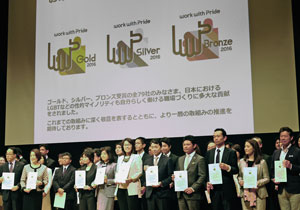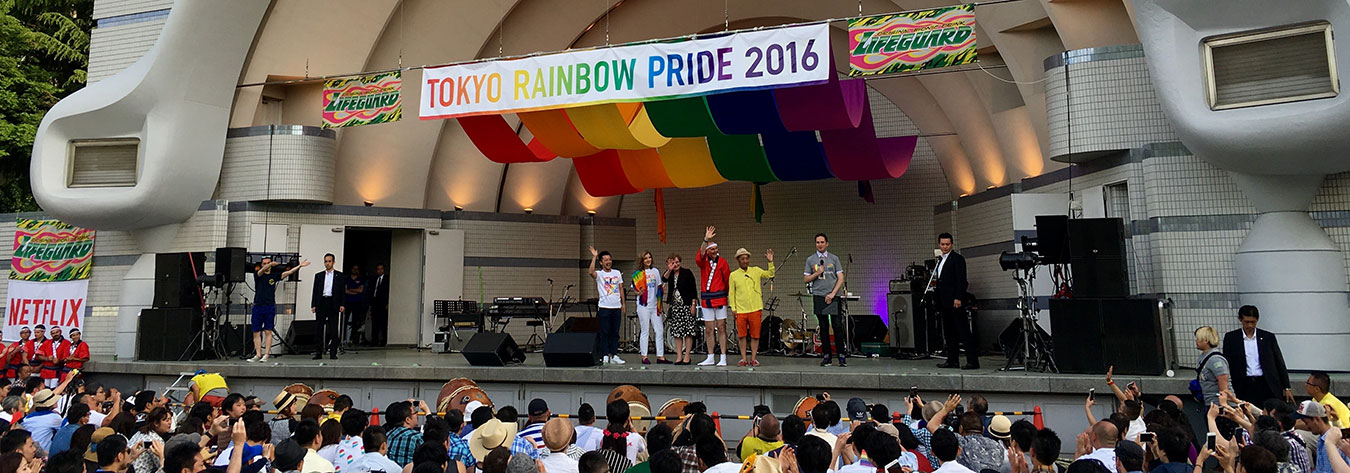Diversity in the workforce is a contentious issue that historically has faced multiple barriers worldwide and continues to do so. Nevertheless, the business case for diversity is that, ultimately, it will provide access to a greater talent pool, as well as fresh ideas.
And this is no different in the retail industry, which, as a public-facing sector, arguably has an important role to play in changing attitudes in society, as well as representing the communities served by shops.
In the UK, great strides have been made over the past two decades to eradicate discrimination in the workplace in a range of industries, with legislation having been passed to tackle discrimination based on ethnicity, gender and nationality. But in this area, Japan is trailing behind. For the lesbian, gay, bisexual and transgender (LGBT) community, there are no legal prohibitions on discrimination in the workplace, and only nascent supportive policies.

Hachiko supports same-sex marriage.
In Japan, government policy is focusing on the importance of women in the workplace as part of Prime Minister Shinzo Abe’s signature economic policy, Abenomics, and its “third arrow”. But there has been no move to ban discrimination based on sexual orientation, in either the workplace or other areas of society.
Japan is still at the initial stage of the fight for the rights of the LGBT community in the workplace. This is the position in which the UK found itself in the 1950s and ’60s, when various committees were formed to promote legal and social equality for the LGBT community. In 1977, the first gay and lesbian Trades Union Congress conference took place in the UK, to discuss rights in the workplace.
Then in 1996, the UK case P v S and Cornwall County Council was brought before the European Court of Justice. It became a landmark case, in which it was ruled that an employee who was about to undergo gender reassignment had been wrongfully dismissed.
A further milestone followed in 2003, when the Employment Equality Regulations became law in the UK, making it illegal to discriminate against lesbian, gay and bisexual employees in the workplace.
In Japan, however, progress has been much slower, with sexual orientation still shrouded in controversy.
It was only this year that Japanese political parties—the Democratic Party of Japan, the Japanese Communist Party, the Social Democratic Party and Seikatsu no To—submitted a bill to the Diet seeking to eliminate discrimination against LGBT people. But this bill, to ban discrimination by businesses and local governments based on gender identity and sexual orientation, is still undergoing deliberation.
Progress in retail
That said, advances in the law do not necessarily equate with increased acceptance in practice.
Although British firms and organisations have made significant progress, with the Security Service, better know as MI5, named as the UK’s top LGBT employer by Stonewall’s Top 100 Employers ranking for 2016, no retailers are on the list.

Unilever was among the firms ranked Gold at the 2016 work with Pride ceremony
The Lush #GayIsOk campaign, launched in July 2015, was an initiative that spoke out against Russia’s anti-gay law. The “We believe in love” campaign that followed was dedicated to the issues faced by the LGBT community in Japan.
Lush then implemented “Partner Registration”, which allows same-sex couples to benefit from the same incentives and bonuses as their heterosexual counterparts. Clauses referring to “gender identity” and “sexual orientation” were added to the non-discriminatory recruitment policy, and the gender part of job application forms was removed.
The Japanese online retailer Rakuten recently implemented spousal benefits for same-sex partners. Previously, these had been enjoyed solely by heterosexual married couples.
Meanwhile, many large, non-retailing firms are providing a model for others to follow. Unilever, with brands that fill shop shelves the world over, is one such example. In both the UK and Japan, it is making efforts to incorporate policies to prevent discrimination in the workplace.
“As a global policy, the Code of Business Principles sets out that all Unilever employees must treat everyone fairly and equally, without discrimination on the grounds of gender, gender identity and/or sexual orientation”, explained Shinmyo Tsukasa, assistant communications manager at Unilever.
The firm has gone as far as to have a Code Hotline for employees to use around the clock 365 days a year, to report any breaches of this policy.
Under the slogan “Let your colours shine”, Unilever Japan launched a new programme in September. Called “Unilever Pride Japan”, it lends further support to sexual minorities in the firm. Initiatives of the programme include expanding the LGBT talent pool and fostering an LGBT-friendly and inclusive work environment. This has included marriage and bereavement leave, as well as special payment for marriage and condolences for same-sex partners.
“We also organised an ally group to promote LGBT-friendly culture within Unilever and Japanese society”, Tsukasa said, adding that they “plan to gradually expand HR policies to parents and children of same-sex partners, along with changes in local laws and regulations. Meanwhile, we are ready to provide further support on request”.
Local efforts
This year, non-profit organisation work with Pride (wwP) published an index that evaluates corporate efforts to support inclusiveness for LGBT employees and sexual minorities. Sony Corp. turned out to be one of wwP’s top entries, and Unilever Japan was also ranked Gold.
The index includes “Policy”, “Representation”, “Inspiration”, “Development” and “Engagement/Empowerment” as factors that firms need to consider.
There are now a myriad of other non-profit organisations—such as Tokyo Rainbow Pride, ReBit and Human Rights Watch—that are starting to speak up for the LGBT community in Japan, fighting political and social barriers from the ground up.
When asked about the difference between the acceptance of LGBT-related policy at Unilever in the UK and Japan, Tsukasa explained that, “it is difficult to compare, because the acceptance or application of LGBT policies are influenced by many different factors, including local laws, regulations and culture”, concluding that “diversity and inclusion are a part of our organisational culture”.
It seems that, until these issues are incorporated into the culture of firms, there will continue to be difficulties for members of the LGBT community within the retail trade and other businesses.




